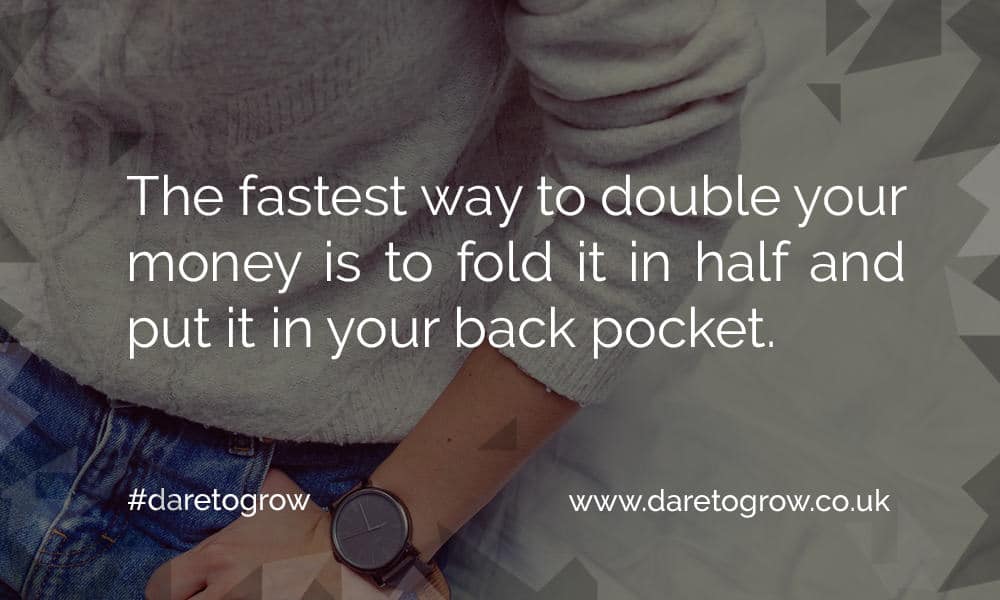
I know why you’re broke and in debt
You’ve clicked on this blog because you’re in debt and looking for a way out, or you don’t have as much cash as you’d like and you would like to find out how to make more money.
I know this because this was me a year ago. In fact, I think this has always been me. They say the Universe will keep serving up the same lesson to you until you learn it. Well, I seemed to be constantly low on cash and high on expenses…until I learned and acted on the lessons I’m about to outline in this blog.
I never knew how to handle money and it took me a long time to (a) recognise this, (b) face up to it and (c) take action on it. But, when I did see it, face it and act on it the results came in quickly.
Changing your attitude to money is all encompassing and it’s not just about money either. It’s such a complex situation and in this blog I want to sum up the keys reasons you could be in debt (and broke to boot) in the hope that it helps you to come to terms with it, change your attitude to money and ultimately take the action needed to free you from debt and lead you to abundance.
In the words that follow, I’ll outline the reason and then suggest an idea to change your attitude to money.
You don’t think you deserve wealth
I’ve grown up in a very working class family and like many children from working class families I have been spoilt rotten! I have a few friends from much wealthier backgrounds and when we talk about our childhoods it’s very clear that I was never denied anything – in fact I’d say my parents worked even harder to make sure me and my brother had everything in life. By contrast, my friends from wealthier backgrounds seemed not to have the same luck – they were taught to wait, and save for things, to truly value what they got. They were not spoilt in the same way.
Both my parents worked their backsides off their whole lives to make sure me and my brother, Jason, had everything everyone else had. They even sent us to boarding school and then private colleges to give us the best possible start in life.
Growing up, me and my brother were also taught the golden rule: share. Every time I got 50p off my nana, or £10 in a card for my birthday I heard the words: “you are such a lucky girl, that is so much money”, “ee, Lisa you are spoilt” and “are you going to share it with your brother?”. Every single sentence was said with love but every single sentence also sunk deep into my subconscious and taught me that money was about being lucky, being spoilt, and sharing. Even now, I have to work hard with myself to ‘hang on’ to my money and not feel guilty about it, or respond to the desire to share every penny.
Do you feel like this? Guilty about having money? Do you feel an overwhelming need to share it, or get rid of it somehow? You might have heard different messages about money. You might have grown up and heard ‘money is evil’, or ‘we’re poor and can’t afford that’, or ‘life is unfair – the rich get richer and the poor get poorer’. It doesn’t really matter. The point is that if you are constantly broke, or in debt or without money you must be holding a view about money that doesn’t serve you.
You’ve probably heard tales of lottery winners losing all their winnings in the space of a few years? This happens because the thoughts we all think create our reality. Winning money doesn’t change our thoughts about money and ultimately lottery winners’ thinking returns them to a reality to which they were always accustomed.
Sit for a moment and think back. What have you been taught about money? What do you believe to be true about money? In your mind, what is money for? What do you want it for? How has money been described to you in the past? Like I wrote above, I have previously thought that money is about being lucky, being spoilt or needing to share. I now recognise this and I have to tell myself daily that I deserve what I earn: I work for it and am allowed to keep hold of it. In the past, I emptied my bank account in order to make my reality match my thinking around money. Now, I keep tight hold of a portion of my earnings because I know I can add far more value in the world when I’m financially free than when I’m in debt.
You’ve never been taught to handle money
I love my parents so much. They’re warm, loving, caring and just plain lush! They taught me to be kind, gentle, loving and generous but they never taught me how to handle money and that’s not their fault. No-one sat them down and said: “here are the five things you must teach your kids about money”. They taught us what they know and treated us with love and kindness and generosity every day. The same is true for my teachers: they taught me many wonderful things but you never really get taught how to make, keep and grow money whilst at school do you? This is something we need to learn for ourselves.
For example, I remember going to PC World with my dad when I was 18 or so. We were going to buy my first lap top and I was so excited. He said to me: “Stretch your budget Lisa, buy the very best you can afford so it will last longer”. He even offered to pay the difference himself. I internalised that message (and many more messages like it) and for the next ten years, I bought the very best of everything I could afford knowing it would last longer and I’d find a way to pay for it: the better the equipment, the better the output right? Just a few years ago, I upgraded the IT equipment in Digitia (my marketing agency) from PCs to Macs and used finance to do it. Oops.
To be clear, this is not my dad’s fault. He never told me to get into debt and in fact when I took on the loans he was very uncomfortable. I was doing the best with what I knew to be true at the time – I had a plan and I knew it would work. Meanwhile, I was reading books by multi-millionaires saying things like “the only way to get rich is to borrow money and put it to work”. Some of these people were recently declared bankrupt, or have had a lot of poor media coverage due to their morals. I just didn’t know what I didn’t know and this is why we owe it to ourselves to constantly learn new things from lots of different people in different generations and industries.
The truth is that I got myself into debt: I spent more than I could afford to pay for and that’s my doing. You could argue that I was investing in my business but it was all too close to comfort for me. I borrowed £30k from the funding circle, £20k from the bank in the form of an overdraft and other money to expand into Manchester and take Digitia to the next level. I was building my business on sand and I quickly found myself making decisions based on money, earnings and cashflow and not based on my vision, values and innovative thinking. Eventually I had to take it all down to rebuild the foundations.
On the plus side, the attitude I had to money got me that far. By the time I was 28, I’d built two six figure businesses. By the time I was 29, I’d sold one of them, launched my dream business (a coaching business). By the time I’d reached 30 (May, 2016), I’d downsized Digitia, dramatically reduced all expenses and paid off the £70k of debt I’d taken on. I have reset my values around money and am now in a financially stable position.
The point is this: if you’re in debt it might be that you’ve internalised some messages about money that no longer serve you. When you realise this, don’t blame anyone and don’t beat yourself up. You always do the best with what you know. Now that you know something new it’s time to get smart about money. No-one will teach you about money, you need to educate yourself. That’s what I did, and that’s what you’re doing by reading this blog.
You’re trying to prove something
One of the biggest drivers of debt is the ego! You’ve heard of the phrase “keeping up with the Jones”. It means buying something to show you’re just as good as, if not better than the people around you.We want to prove to bullies, doubters, judgemental ‘friends’ that we can make this work. It’s the reason we buy brands and things we can’t afford – to show we’re doing okay. It’s the very reason advertising works – to get you to believe you can be younger, sexier, happier, wealthier, smarter, luckier…with this special product. It’s the very reason many people take on personal credit cards or overdrafts: “I deserve this and I want it now”, “when I get this product I’ll be able to make more money”, “I want to feel good now so I’ll invest in this now and pay later”.
I’ve done this and I’m not ashamed to admit it; recognising damaging patterns is an important part of coming to terms with them and making key changes in your life. The way I did it was by taking on fancy offices before I really needed to and buying expensive equipment, again, before I really needed to. I didn’t know it at the time but I was trying to ‘prove’ my worth to potential clients, and quite possibly my team. I wanted them to trust in my ability and my vision and I thought they all needed to see big offices, fancy Macs and a multi-skilled team to do this. It turns out none of this is true. In fact, me and Alice now work from home with a Mac each and the clients love what we do. They trust us, and they trust in our knowledge, ideas and experience.
Are you competing with someone? Are you trying to fill a void? Are you trying to prove something? If you want to change your financial situation, start by realising that this kind of behaviour does not serve you longer term. If you find yourself trying to prove something, ask yourself where this might have come from…what is driving this behaviour? Has someone said something you’ve held on to? What is your belief about success and where did you build it? Does it serve you? If not, start by recognising this and saying every day as many times as you can: “I am willing to release the pattern in me that created these conditions”. Over time you’ll realise you do not need to prove anything. The people who love you don’t care about any of this: they just want you to be happy, safe and abundant.
You don’t value your time
I am ridiculously generous…with money, time and anything else I have. If I’m out with people I will be the first to offer up my bank card to pay for drinks, meals and experiences and it doesn’t always come back. I’ve had to learn that there are two types of people in the world: givers and takers. With ‘givers’, they’re just the same as you – they want to pay, or they at least want to pay their way. Takers are different – they see no problem with accepting your offer to pay and why should they: you did offer after all.
In business, this translates in another way. If you offer people a really good deal they’re going to take it even when it seems too good to be true. In order for your business to be sustainable, you’ve got to charge what you’re worth and this isn’t just what your time is worth; this is about billing for the value you add to people. Value comes from all the training you’ve paid for, all the books you’ve read, all the hours you’ve clocked in developing your skills, the difference you will make to this client and all the time you’re thinking about this client outside of the billable hours.
Something I’ve come to realise in the last year is that it’s very hard to find financial freedom (being able to earn a living and spend your time how you want to) if you sell your time. You can’t get more time. It’s important to find a way to put your experience and value into a product people can buy when you’re asleep. This means more people can benefit from your experience and knowledge more frequently and it means your income isn’t dependant on your being active every second of every day. What happens if you need time off? This is why the ‘information market’ has become so huge over the last five years: people have learnt how to get their value into downloads and other products people can buy and access online.
If you’re not making enough money to cover your expenses ask yourself: do I really charge what I’m worth? Am I allowing people to take advantage of my generosity? What would I be willing to pay for this service if I bought it from someone else? Do these fees reflect the time, care and input that goes into this work?
People will value your time in the same way you do: if you won’t value it neither will they.
You are led by your short term desires and not your long term goals
I want to lose weight but I want that ice cream more. I want to save money, but I want that holiday more. I want to get that blog finished but I want to watch that box set more. Come on, we’ve all done that!! Setting up your dream life is a constant trade off between what you want right now and what you want tomorrow.
I know people talk about enjoying life, being present and living for the moment but sometimes you do need to sacrifice a few indulgences in the short-term to invest in your future.
A lot of these short term indulgences are not driven by your long term goals, but your short term feelings. You might be scared to fail so never begin. You might feel left out if you don’t go to that party so you leave your work undone and go. You might feel tired that you stop and put on the boxset.
The same is true with money. When getting out of debt and learning to live a life of abundance you must learn to delay gratification. You’d be amazed how long you can go without new clothes, cinema trips and meals out.
Me and Alice had all sorts of ‘alternatives’ to spending money. We’d go on walks with picnics, use coffee loyalty cards we’d saved up and invite family to our flat for a low cost weekend of games and homebaked scones. A particular treat was buying a foodee magazine and buying the ingredients to cook at home. I’m a massive fan of novelty so whenever I cooked, I’d put all the extras (cheese, sour cream etc.) in little bowls so we could get the restaurant feeling.
We now have money but we’ve conditioned ourselves to value every penny. We still bake treats instead of buy them, we still go for walks in the park with a picnic and we still find the low cost alternative to nearly every activity.
Final thoughts:
If you’re in debt and feel like there is no way out I want to tell you that every situation has a solution, no matter how lost you feel. Take control of your life. Get help if you can but the most important step you can take now is to face up to it in full.
I remember the day I realised I was in £70k of debt. It was months after the decisions I’d made to downsize Digitia and I hadn’t been able to face the true number until that day, sat in a library in Northallerton. I knew it was bad and I knew I was in trouble. I also knew I could find a way through. I jotted it all down and it came to £70k+, never mind the money I owed each month (some £20k – £30k) just to keep on top of wages and rental costs etc. I felt sick to my stomach and that day I knew I had two choices: (1) sink into depression, cry and avoid it at all costs or (2) sit up, accept that make it happen and learn everything I could about money to get out of this situation. It was on me. I read everything I could about money, wealth and getting out of debt. 12 months later, I am debt free but perhaps more importantly than that, I now know how to handle my money. The debt was my greatest teacher. Perhaps your debt is here to teach you how to handle money.
Acknowledge the lessons, take different actions and keep the end point in mind. You can do this and you will, by reading this blog you’ve already begun.
Disclaimer:
I am not a financial advisor and I do not provide personal debt advice. This blog shares some personal insight I gained from getting into and out of debt but all information found here is for informational and educational purposes only. It should not be construed as personal debt advice.
___ ___ ___ ___ ___
Upcoming Events:
Come along to a DARETOGROW event. See me talk live, enjoy a drink on arrival and meet likeminded people on the same journey as you!
No Events on The List at This Time



